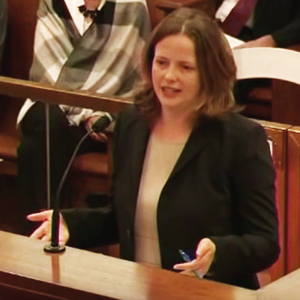Monster Beverage Corp. sued to block City Attorney investigation into its marketing of hyper-caffeinated energy drinks to children as young as six, despite known health risks

PASADENA, Calif. (April 11, 2016)—A three-judge panel of the Ninth Circuit Court of Appeal heard arguments last week in Monster Beverage Corp.’s appeal of a 2013 district court decision allowing San Francisco City Attorney Dennis Herrera’s consumer protection lawsuit against the energy drink maker to proceed in state court.
Representing San Francisco, Deputy City Attorney Tara Steeley argued that California courts have jurisdiction to hear such cases, and that the U.S. District Court properly dismissed the pre-emptive federal suit by the nation’s largest energy drink manufacturer to block Herrera from investigating and pursuing the company’s alleged violations of law. A video of oral arguments before the panel in Pasadena, Calif. on is available at:
Said Herrera: “Monster Energy continues to push its bogus defense that it’s being unfairly singled out because agencies and consumer advocates aren’t similarly pursuing Starbucks over caffeinated coffee. The argument hopes we’ll somehow forget, of course, that Monster markets its highly-sweetened, fruit-flavored caffeine drinks directly to youth—despite the known health risks that these products pose to young people—and that Monster’s marketing messages have frequently encouraged excessive consumption.”
A Dec. 16, 2013 district court ruling by Judge Virginia A. Phillips cleared the way for Herrera’s state court consumer protection action, which alleges that the Corona, Calif.-based Monster Beverage violated state law by targeting youth—including children as young as six-years-old—in its marketing of products that pediatric studies show “may lead to significant morbidity in adolescents.” A representative article in Pediatrics in Review concluded that the particular health risks that highly-caffeinated, sweetened energy drinks pose to youth derive from “cardiovascular effects, withdrawal symptoms, mixing with alcohol, association with substance dependence.” (Source: Blankson et al., Energy Drinks: What Teenagers (and Their Doctors) Should Know, Pediatrics in Review, 2013;34;55.)
The National Collegiate Athletic Association, which represents more than 400,000 student-athletes at more than 1,000 North American colleges and universities, currently prohibits its member institutions from distributing caffeinated energy drinks to student-athletes. The NCAA has concluded that energy drinks “pose a health and safety risk for student-athletes,” and “can have adverse health consequences if consumed before or during strenuous exercise.” Pediatric studies have similarly found that the cardiovascular effects “of heavy caffeine use can be a significant source of morbidity in athletes,” citing new-onset seizures, hypertension, heart palpitations, and diuretic effects that can “lead to dehydration in athletes who do not drink enough fluids to compensate.”
Herrera’s lawsuit is: People of the State of California v. Monster Beverage Corporation, San Francisco Superior Court No. CGC‐13‐531161, filed May 6, 2013. Monster’s appeal of its pre‐emptive federal action is: Monster Beverage Corporation v. Dennis Herrera, U.S. Court of Appeals for the Ninth Circuit, 13-57128 (originally filed in U.S. District Court, Central District of California, Eastern Division, CV‐13‐00786, on April 29, 2013).
# # #